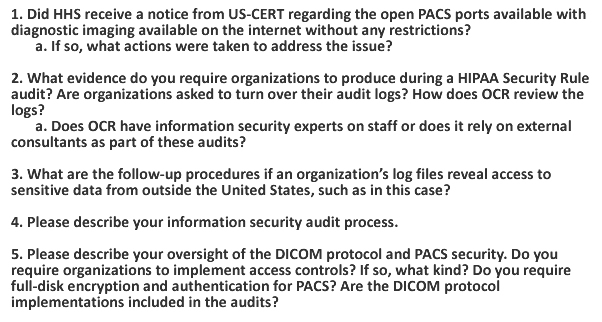U.S. Senator, Mark. R. Warner (D-VA) has written to the Director of the HHS’ Office for Civil Rights, Roger Severino, expressing concern over the HHS response to the mass exposure of medical images by U.S. healthcare organizations.
Sen. Warner is the Vice Chairman of the Senate Intelligence Committee and co-founder of the Senate Cybersecurity Caucus. This is the latest in a series of communications in which he has voiced concerns about cybersecurity failures that have compromised the personal and private information of Americans. In February, Sen. Warner demanded answers from HHS agencies, NIST, and healthcare associations about healthcare cybersecurity following the continued increase in healthcare data breaches.
His recent letter to OCR was in response to a September 17, 2019 report about the exposure of millions of Americans’ medical images that were stored in unsecured picture archiving and communications systems (PACS).
The report detailed the findings of an investigation by ProPublica, German public broadcaster Bayerischer Rundfunk, and vulnerability and analysis firm, Greenbone Networks, which revealed almost 400 million medical images could be freely downloaded from the internet without authentication. Sen. Warner pointed out that at the time of writing the letter, “for all U.S. territories there are 114.5 million images accessible, 22.1 million patient records, and 400,000 Social Security numbers, impacting an estimated 5 million patients in 22 states.”
Sen. Warner stated in the letter that the exposure of the medical images not only has potential to cause harm to individuals, it is also damaging to national security. The types of exposed information could potentially be used by cybercriminals in phishing campaigns and for other malicious attacks, such as those aimed at spreading malware. Flaws in the DICOM protocol could be exploited to incorporate malicious code into medical images. Nation state actors or cybercriminal groups could have downloaded the images, inserted malicious code, and then uploaded the images without being detected.
One of the U.S. firms implicated in the ProPublica report was TridentUSA Health Services and one of its affiliates, MobileX USA. In September 2019, following publication of the report, Sen. Warner wrote to TridentUSA Health Services demanding answers about its cybersecurity practices and how the data of millions of Americans, which the company was responsible for keeping private, came to be exposed online and required no password or other means of authentication to access.
In his letter to OCR, Sen. Warner explained that TridentUSA Health Services, a HIPAA-covered entity, responded to his letter and stated it had passed an HHS Security Rule audit in March 2019. That audit was passed even though at the time of the audit medical images under its control were exposed online and could be freely accessed over the internet.
“As your agency aggressively pushes to permit a wider range of parties (including those not covered by HIPAA) to have access to the sensitive health information of American patients without traditional privacy protections attaching to that information, HHS’s inattention to this particular incident becomes even more troubling,” wrote Warner.
The exposure of PACS data was reported to US-CERT by the German Federal Office for Information Security. US-CERT made contact with Greenbone Networks and confirmed the exposed data had been received and said that the matter would be reported to the HHS. Greenbone Networks had no contact from HHS and no further contact from US-CERT.
The researchers in Germany also demonstrated to Sen. Warner that even on October 15, 2019, several US-based PACS have open ports that support unencrypted communications protocols. Those unsecured PACS could be accessed without authentication and a wide range of medical images could be viewed and downloaded, including X-rays and mammograms that contain sensitive patient information such as names and Social Security numbers. Those images and personal information were still accessible freely online on the date of writing the letter (Nov 8, 2019).
“As of writing this letter, TridentUSA Health Services is not included on your breach portal website and I have seen no evidence that, once contacted by US-CERT, you acted on that information in a meaningful way,” wrote Sen. Warner.
Sen. Warner has demanded answers to 5 questions:
The post Sen. Warner Demands Answers from HHS Over Apparent Lack of Response to Major PACS Data Breach appeared first on HIPAA Journal.

